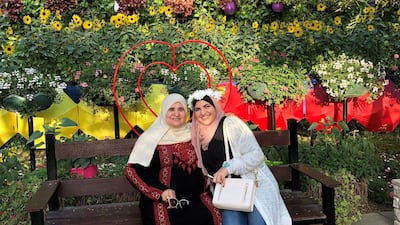"Where are you from?" It's a simple question, but I always seem to hesitate when formulating an answer. Do I say Palestinian? No, then they'll ask about my accent. American? But I look Arab. Both? That only leads to an endless series of questions. Small talk is bound to become a longer, unsolicited conversation and there's always the potential for judgment. Living in the UAE, however, has allowed me to be myself and, for the first time, I don't stop to think when I answer: Palestinian-American.
Here's a short rundown of my history: my parents are Palestinian, I was born and raised in the US and have lived in Jordan, Abu Dhabi and Dubai over the course of 18 years. I speak both English and Arabic and have been privileged with a US education.
My background isn't a particularly striking one, but I struggled increasingly with each move, grappling to understand my identity. There was a constant expectation to favour the part of my identity that best suited the country I was in, to choose one part of my background over the other. The clash of cultures was not considered normal in Jordan's homogeneous society, where my native English and education was praised by some, but frowned upon by many others.
I was an outsider in my own home, not considered Arab enough. In the US, despite the presence of a large Arab, Arabic-speaking community, wearing a headscarf and participating in Palestinian traditions made me different from the general public – something that was not always seen in a positive light. At the end of the day, I wasn’t American enough.
From there began the internal battle for me to choose one part of my identity, represented in the fluctuating nature of the clothes I wore, the language I spoke, the food I ate, the books I read … the list goes on. Moving to the UAE has changed that. I can wear either joggers or an abaya and speak English and Arabic in the same sentence, if I'm not busy learning phrases in a new language. There is no longer a presumption that I should fully be only one thing, nor do I have to meet specific criteria.
Dubai and Abu Dhabi, the cities where I live and study, are hubs of multiculturalism, packed with more nationalities than you can count. And so, I can choose to dial up how American or Arab I am. Sometimes I even dial both down and expose myself to the other, seemingly endless number of cultures scattered across the Emirates.
Memories of my grandma's kitchen are stirred in Downtown Abu Dhabi, within the folds of Bab Sharqi Restaurant's zaatar manakeesh, the hummus at Abd El Wahab and the complimentary tea with mint that is served with the falafel at Beit El Khetyar.
I read menus in Arabic and translate them for my English-speaking friends, but I enjoy dinner at the Olive Garden and brunch at Denny's, too – waffles and maple syrup also serve as reminders of my childhood. I study at the diverse NYU Abu Dhabi and my desi friends take me to eat naan and butter chicken at Boti Street on weekends, or I take the 10-minute taxi ride to Meknes Restaurant for Moroccan madfouna.
Ramadan includes answering questions about fasting with arms wide open, going to the mosque right around the corner from my house to pray and, at the end of the holy month, celebrating Eid with family. I host friends at Thanksgiving, take my siblings trick-or-treating and decorate a Christmas tree every year.
I can see Palestinian singer Mohammad Assaf and Scottish musician Lewis Capaldi in concert one month, watch South African comedian Trevor Noah at du Arena and attend a Holi festival celebration the next. The Hay Festival in Abu Dhabi in February will feature poets, musicians and historians from countries such as Syria, the Philippines and the UK.
Language is not a barrier, as you might expect in a new country, but rather it provides me with an eagerness to learn. I know phrases in Korean, French and Spanish. I not only speak Palestinian-Arabic, but have become fluent in Egyptian and Lebanese dialects. Growth is at the tips of my fingers, both within my comfort zone and beyond.
I came to the UAE while I was still trying to create an impossible balance between the two parts of my identity, in fear of losing one of them altogether. Not only have I found it easy to increase or decrease my American-ness or Arab-ness, but I have also been exposed to a range of different cultures. The Year of Tolerance may have come to an end, but the UAE's multicultural scene continues to remind us of the importance of inclusivity, acceptance and peaceful coexistence.

